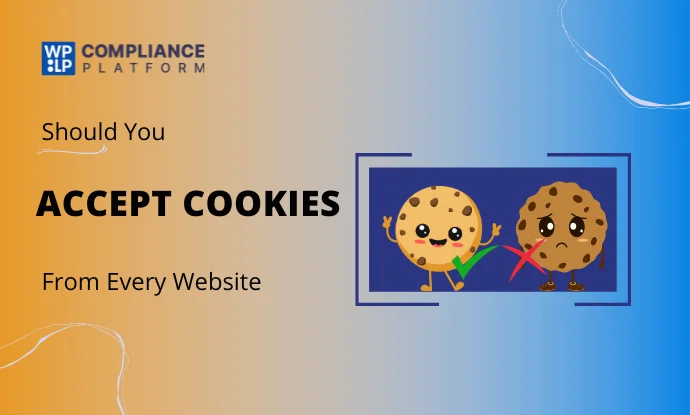Should You Accept Cookies From Every Website?

Being a frequent internet user, you would have indeed come across the accept Cookie notification popping up on the websites you visit. Most people click on Yes or Accept without thinking about it.
If you are facing similar issues, do you have any idea what cookies are used for on websites? Should you accept cookies? Or what happens if you don’t accept cookies? Would you still be able to use the site?
Do you find yourself tangled in the question of whether to accept cookies? This post has all of the answers.
What are Cookies?
Stop thinking about yummy cookie snacks. Right now, we’re talking about a computer file that’s increasingly becoming important. The basic version of the cookie is a simple text file available on your system.
When you visit a website that uses cookies, a cookie file is saved to your device. It stores the name of the site and the unique ID representing you as the user. This way, whenever you visit the site again, it will recognize you.
Hence, the companies can customize their sites for you as they are already familiar with certain information. However, it would help if you kept in mind that not every cookie would be similar. Rather, there are three different types of cookies, such as:
1. First-Party Cookies
These cookies are stored on the computer even after you close the browser. However, they have an expiry date. These cookies are used only by the website owner. Their main purpose is to improve the website experience, such as remembering your preferences, automatic login, and more.
2. Third-Party Cookies
These cookies are stored, but they are neither managed nor created by the website owner. Generally, information brokers create these persistent cookies to accumulate your data as you continue your online activities. Such cookies take your data and share it with advertisers so that they can show you targeted ads.
3. Session Cookies
These are temporary cookies and get deleted when you close the browser. Session cookies keep bits of relevant information currently, such as the last thing you searched on the website and more.
What Information Do Cookies Store?
It is obvious that a cookie stores the website name and login credentials. However, additional data may also be present in some cookies. For instance, some cookies may contain:
- The period you spend on a site
- Links you clicked on a site
- The settings, preferences, and options you choose
- Types of accounts you logged into
- A record of the pages you visited
- Items in your shopping basket
Should You Accept Cookies Policy from Every Website?
It’s generally a good idea to review and consider accepting cookie policies on websites. Cookies are small files that websites store on your device to enhance your browsing experience.
However, it’s important to be selective and only accept cookies from trustworthy websites. Some cookies are necessary for the site to function, while others may be used for tracking and advertising purposes.
Before accepting cookies, check the website’s privacy policy to understand how your data will be used. If you have concerns about privacy, you can adjust your browser settings to manage or block cookies selectively.

Should You Accept All Cookies?

When it comes to figuring out whether you should accept the cookies or not, the answer would be that you don’t necessarily have to do it. In case a cookie has identified you, it is your wish to accept or decline.
Not all cookies create an issue. Website owners generally use them to improve their websites and their navigation. However, cookie-using websites are still obliged to obtain your permission or face massive fines under various laws.
When You Should Accept Cookies
Accepting cookies on websites can be beneficial in certain situations. Consider the following scenarios:
- Personalized Experience:- When you want a more personalized experience on a website, such as tailored recommendations, saved preferences, or customized content.
- Remembering Login Credentials:- If you frequently visit a website and would like your login credentials to be remembered for convenience.
- Shopping and Transactions:- When making purchases or engaging in online transactions, accepting cookies can streamline the process by remembering items in your cart or payment details for future visits.
- Site Functionality: Some websites, such as those with interactive features, user account management, or language preferences, require cookies to function properly.
- Analytical Purposes:- If you are interested in helping website owners improve their services by allowing them to collect anonymous data for analytics and performance monitoring.
Remember to review the website’s privacy policy to ensure that your data is being used responsibly and transparently. When deciding whether to accept cookies, consider the trade-offs between convenience and privacy.
When You Shouldn’t Accept Cookies
Being mindful of these considerations can help you make informed decisions about your online browsing habits.
- Privacy Concerns:- If you have privacy concerns and are uncomfortable with collecting and tracking your browsing data, it may be best to avoid accepting cookies.
- Security Risks:- Refraining from accepting cookies when dealing with unfamiliar or untrusted websites can reduce the risk of potential security vulnerabilities and unauthorized tracking.
- Unnecessary Data Collection:- If you believe that the website’s use of cookies is excessive and not essential for your interaction with the site, avoiding cookie acceptance can prevent unnecessary data collection.
- Shared Devices:- Using a shared or public device may necessitate declining cookie acceptance to protect your personal information and browsing history.
- Avoiding Targeted Advertising:- Opting out of cookie acceptance can help avoid being targeted with personalized advertising based on your browsing habits.
By being mindful of these considerations, you can make informed decisions about whether to accept cookies, taking into account your privacy, security, and browsing preferences.
What Happens If You Don’t Accept Cookies?
If you are thinking, what happens if I don’t accept cookies, we have got you covered. If you don’t want a website to store your personal information, you can decline and say no.
Even if you do so, there should not be any issue or hurdle in your navigation, and most of the websites should work just fine.
However, once you decline, you will have to provide your information again the next time you visit the same site. This will be repetitive, regardless of the number of visits.
The other side of not accepting cookies is that certain companies may not allow you to use their site unless you have accepted the cookies. Specifically, after the GDPR introduction, certain websites no longer allow access without cookie acceptance. The reason behind this is that certain websites don’t work as intended without the acceptance of cookies.
When Should You Decline Cookies?
There are two different scenarios when you should definitely decline cookies.
- If you see the name of a third party in the cookie notification, you can either unselect those parties or decline the cookie. Generally, such companies gather bits and pieces of information from thousands of websites to develop a detailed profile. While sometimes this may benefit you, other times, it may create a lot of trouble for you.
- The second scenario where you can decline cookies is if you are visiting a non-secure website. This site already showcases how much the owner undervalues visitors’ personal information. This is essential, especially when surfing on public Wi-Fi, which can increase the chances of cookie theft.
- Marketing cookies are the most challenging cookies because they are used to provide customized advertisements based on your browsing behavior. They follow your activity across several websites to create a profile of you, so if you don’t want personalized advertising, block or limit these cookies.
How to Protect Your Content?
When it comes to keeping your content and information safe with cookies, there are a few essential factors that you must keep in mind.
- If you use public Wi-Fi, browse incognito mode to avoid saving cookie information.
- If you want to customize your browsing experience without sharing your personal information with third-party websites, you can install a browser extension that allows you to select the type of information you want to share and with whom.
- However, if you don’t wish to install any extension, go into the browser settings. You can find a cookie setting there and choose the option that states don’t use third-party cookies.
- Furthermore, if you are unsure whether you have given away a lot of information, you can redo the same in your browser. To do so, visit your browser and clear all of the cookies to begin fresh. This will not log you out of the Google account. However, the next time you visit any other website, you will have to reread the cookie notice and decide whether you wish to allow them to use your information or not.
Accept cookies mean giving permission for a website to store and access small text files on your device to enhance the browsing experience and track user interactions. Users should review the website’s privacy policy to understand what data is collected through cookies and how it is utilized.
When you accept cookies on a website, you are giving the site permission to store small text files on your device that track your online activity. This allows the website to remember your preferences, improve browsing experience, and provide personalized content.
Accepting cookies is generally safe for improving website functionality and personalizing user experience, but caution should be exercised with unknown sites to protect privacy and security.
Conclusion
Now that you know what cookies are used for on websites and have an answer to the question of whether you should allow them, you should consider adding a cookie policy banner to your own website. This is a relatively simple process.
If you run a website and want to add a cookie banner, you can consider installing a free WordPress cookie consent plugin, WP Cookie Consent.
Loved reading this article, try reading our other interesting article.
- How To Add Copyright Text To A Website
- Do I Need A Privacy Policy For My Website? – A Beginner’s Guide
- What is a Cookie Consent Manager? – An Ultimate Guide
If you want to create a unique cookie consent banner, grab the WP Cookie Consent plugin now!
